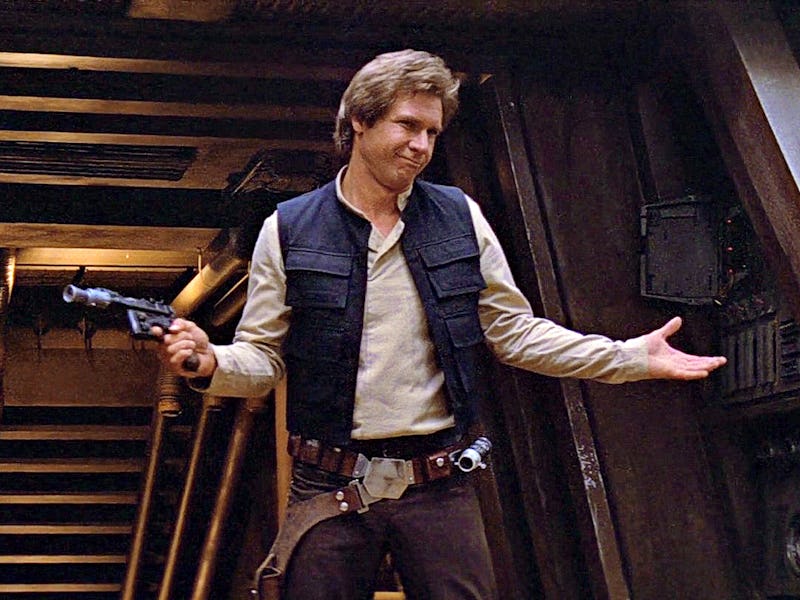Why 'Star Wars' Fan Theories Are Different Than Any Other Franchise
It's basically all prequels and pre-written arcs.

When Han Solo was stabbed by his son’s lightsaber in The Force Awakens, my first reaction wasn’t sadness, but instead, a suppression of the urge to yell “I called it!” at the movie screen. In some ways, having my prediction about a plot twist in the new Star Wars movie validated was more important than being emotionally moved by what happened on-screen. I’d become a shady gambler, glad that the money I’d placed on a horse being ridden by Adam Driver was winning. But, even though I was right about Han dying, it didn’t happen exactly how I thought it would. A predictable and formulaic space opera surprised me even though I’d largely deduced what was going to happen. Even when Star Wars fans are right about our predictions, we’re still totally wrong.
Including Rogue One, exactly half of all existing Star Wars movies are prequels, meaning that half of the time, the audience knows what will happen in the future. Generally, this has given birth to a strange type of anticipation monster surrounding the release of a Star Wars film: A majority of fan speculation in the time between movies is about how plots with previously established endings will go down. If all the Star Wars films were like a cinematic universe based on Moby Dick, then most of the conversations can basically be boiled down to this: Will we see the whale in this one or what?
This isn’t to say prequels aren’t an inherently positive medium for telling stories: The Godfather Part II is sort of a prequel, as are over half the X-Men movies. It’s just that the preponderance of backstory installments in Star Wars over the years has systematically dulled our ability to talk about the “story” as a whole. Almost every fan speculation discussion about Star Wars has to adhere to what we already know since so much of what happens in any given Star Wars movie is just an echo of itself.
Which is why the predictions could be right in general, but wrong in specific. Back in 1980, when the Star Wars franchise wasn’t so precious, it was able to take big risks and surprise us with twists that literally no one could have seen coming. Han frozen? Darth Vader is related to who? It’s hard to remember now, but the coolest things about Star Wars was the fact that both A New Hope and The Empire Strikes Back were unpredictable.
But now that those patterns are familiar to us; we expect those patterns. And to a certain degree, Star Wars movies will always be trafficking in narrative details that can’t really be changed. So in order to have fun with our predictions about something like Rogue One or the upcoming Han Solo prequel, we tend to be conservative (we’ll see Tarkin), while our predictions about the sequel to The Force Awakens tend to be wilder (Snoke is a Ninja Turtle).
But, the underlying issue here is most of what could surprise us in a Star Wars movie has to also be something we kind of already expect. That means we are just trying to read the minds of screenwriters and directors, who, on some level, are just alternate universe versions of ourselves. J.J. Abrams, Gareth Edwards, and Rian Johnson are bigger Star Wars fans than George Lucas, but they’re also professional filmmakers. If, in an alternate dimension, they were just fans who weren’t allowed to make new Star Wars movies, none of them would agree with each other over what should happen in the various Star Wars movies, because each one would have a slightly different conception of what fan service looks like.
The real plot twists in Star Wars are seldom surprising anymore, because they’re just a form of twisted fan service. This isn’t to say these moments — like Kylo Ren’s dark deeds — aren’t exciting and gripping. It’s just that the events themselves aren’t that shocking. The most surprising thing that can happen in Rogue One would be if the Rebels somehow didn’t steal the Death Star plans, and an alternate continuity was suddenly formed.
But, because we all know that’s not going to happen, our ruminations about the Star Wars movies will continue to live in the places where most of the conversations have historically happened: the devil’s in the details of larger events we already understand.